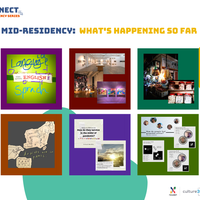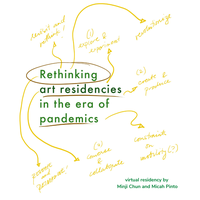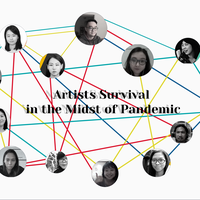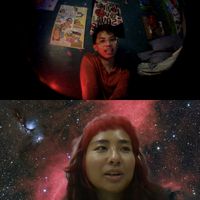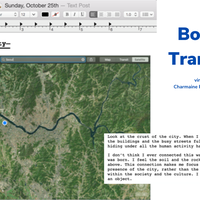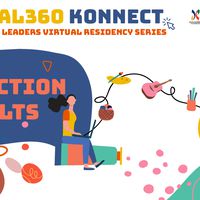Virtual360 Konnect | Artists in Panic! - Chasing a better normal

Participants of the online residency Virtual360 Konnect Sarah Koo from Korea and Mac Andre Arboleda from the Philippines collaborated on “Artists in Panic!” a research piece and zine featuring interviews of Filipino collectives that use art to respond to the Covid-19 crisis. In their final article below, Mac and Sarah describe the experience of working together virtually and share their research findings.
We were five months into the lockdown when we first began to map our research topic. Time was moving differently, and we thought to ourselves: Artists in the Philippines are in panic! It was a sentiment that immediately summed up the bizarre existence we have been living since the outbreak of Covid-19.
With this in mind, we set out to interview artists and cultural workers from collectives in the Philippines on their current struggles--more specifically, those who have been dedicating their creative works in responding to crises. During our month-long virtual residency, we spoke to Julian Rodriguez from Panday Sining, Allen Young from KAMANDAG (Kaisahan ng ARtista at MAnunulat Na ayaw sa Development AGgression), Raphael Ubales and Meryl Ang from Save San Roque Alliance, Juno and Ian (not their real names) from Makò Micro-Press, Karma Kolektib, and Donna Miranda from SAKA (Sama-samang Artista para sa Kilusang Agraryo).
In our final video call, we look back on our research, discuss zine-making practices and our personal experiences from the residency.
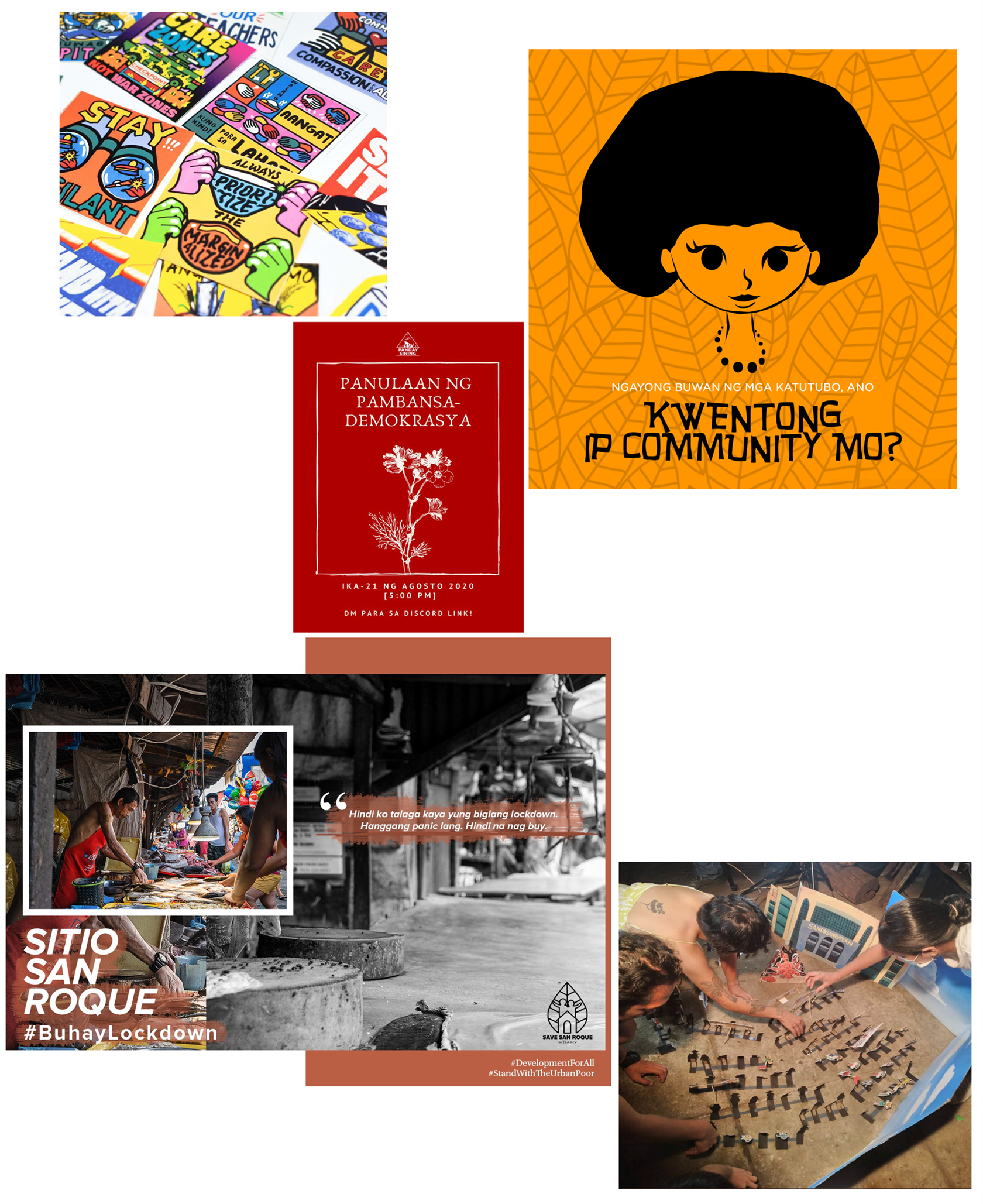
Artist and cultural worker collectives continuously organize events and produce works in order to ameliorate the distresses present within communities of the Philippines. From upper left corner, counter-clockwise: Makò Micro-Press, Panday Sining, Save San Roque Alliance, SAKA, KAMANDAG. Photos courtesy of their respective Facebook pages.
The Situation of Artists and Cultural Workers
Sarah: The keywords of our research questions were "profession as an artist", "emotions", "coping mechanism", "support", and "ideal world". From the answers of the artists we have interviewed, we noticed some common keywords as well: "compromised security", "grief", "financial support", "mental health", "representation", to mention some. It was a little sad that many of our interviewees resonated with the word "Panic" in describing their tales from the lockdown.
There were some divisive opinions on topics such as creativity. While some artists utilised art as a creative outlet for their frustrations, some have decided to take a break from creating art as they could not draw inspiration from the current situation.
However, one common theme emerged from the interviews: In spite of personal struggles, dedicating one's time and effort for the community is a big reward in itself. Hearing that, we felt that solidarity among artists as a part of a community is crucial especially during these times.
Mac: I think the meat of our research really is about how artists are not separate from the communities and the society they inhabit. Artists are not just artists, they are labourers who deserve the right to food, shelter, water, and livable wages, the bare minimum that can lead us to happy lives. There certainly is no "ideal world" that only artists would end up inhabiting--this ideal world includes attaining rights for every single human being. That said, it is inspiring to see and talk to artists who dedicate their work, bodies and energy towards responding to crises in many ways. Artists do not just panic: they act. After all, aren't their works informed by the world they live in?

The pandemic was not the sole source of concern for artists in the Philippines.
Over the past few months, calamities such as earthquakes and some of the year’s strongest typhoons have been putting millions of people in danger.
The Zine in the Digital Space
Mac: During the course of this residency, we started to rethink the concept behind our initial proposal of making an "e-zine." The zine has a long history and tradition of being collaborative, intimate, and sometimes experimental. Because of that, we decided to move away from our earlier plan of simply visualising our research into illustrations and text that would end up in a PDF file (which is flat and not very interactive). We wanted to keep the spirit of the zine that challenges the norm, so we are planning an online exhibit where we could showcase our "e-zine" next month. As the current situation in the Philippines still do not permit us to organise events where we could distribute our work in print, we will be sticking to the digital.
Sarah: The spirit of zines, we believe, lies in their intimate, collaborative, and distributable nature. In that sense, they must be malleable in form. Naturally, the zine-making craft should adapt and continue to embody these qualities that we believe define them. Since physical distribution is difficult during the pandemic, the concept of "owning" a zine (i.e. in a PDF file) had to be reevaluated... and we soon thought there could be a better way: an internet showcase! We are excited to explore the concept of "e-zines" while keeping the above-mentioned qualities of a zine.
From Zoom Meeting to Another

We called each other through Zoom at least once a week. Interviews with artists, which were our main mode of research, mostly took place in video conference rooms as well.
Mac: This is our first time to participate in an art residency, and a virtual one, too! There was already this sense that we were not sure about what we were going into, and the aspect of having to do everything online proved to be challenging. It was like living in this virtual space but also jumping to and around other spaces, both online and offline.
We were both happy to have had the chance to interact with other residents of Virtual360 Konnect, namely Micah Pinto and Minji Chun (Philippines and Korea, respectively), as well as Joshua Eka Pramudya and Benedikta Swasti Renaningtyas (both from Indonesia), as part of their residency projects. Had we not accepted their invitation, this might not have felt like an actual residency. We are very grateful!
Sarah: The whole experience of the virtual residency was new to us, and there were few stumbles; there were days we would suffer from long migraines after hours of video calls. It was all memorable, though! The virtual residency opened an opportunity for us to communicate with artists from other countries, which is a valuable experience in itself. We were both a little nervous but more ecstatic when we got the chance to join video calls with our co-residents.
While face-to-face interactions would have been ideal, we felt that the shared novel experience of the virtual residency connected us. We feel that we have learned so much from the experience.
Keeping hopes ignited
Despite the panic, there is some relief in the idea that we are not alone. This research was personal as much as it was political and philosophical: Our struggles as artists, as human beings, were inseparable from our craft. An artist cannot work if they have no food on the table; they cannot work if they have no livelihood; they cannot "be" if not for human connection. This journey has brought us unbelievable Zoom fatigue! Simply put, we artists must resist this "new normal" and hope for a “better normal”
Although this research can only do as much, we hope this can serve as a documentation of the context we are living in today. Who knows? Maybe tomorrow will be different.
Links for further reading/References
https://cebudailynews.inquirer.net/306464/the-nccas-support-for-cultural-workers-and-artists-in-the-time-of-covid
https://www.instagram.com/p/CGHTGu6BMuh/
https://artplus.ph/how-art-spaces-are-coping-during-a-pandemic/
https://www.philstar.com/lifestyle/arts-and-culture/2020/05/11/2013082/art-post-covid-world https://web.facebook.com/watch/live/?v=266799384390338&ref=external
https://www.esquiremag.ph/culture/books-and-art/artists-commission-work-typhoon-victims-a00289-20201113-lfrm
https://artreview.com/censorship-pandemic-covid-art-philippines-doloricon-green-papaya/
https://artsequator.com/philippines-cultural-sector/
https://www.bandwagon.asia/articles/understanding-impact-covid-19-coronavirus-philippines-metro-manila-musicians-bands-2020-survey-results
https://artplus.ph/how-art-spaces-are-coping-during-a-pandemic/
https://www.msn.com/en-sg/news/world/artists-rally-against-philippine-anti-terrorism-bill-as-fears-for-free-speech-human-rights-increase/ar-BB16efUl
https://www.rappler.com/moveph/artists-fight-back-art-protest-sona-2020
https://reliefweb.int/report/philippines/philippines-typhoon-vamco-ulysses-and-super-typhoon-goni-rolly-snapshot-14
https://newsinfo.inquirer.net/1353961/magnitude-4-5-earthquake-rattles-batangas-intensities-felt-in-muntinlupa-qc
http://bagong.pagasa.dost.gov.ph/products-and-services/satellite
This article is part of a series of articles written by the participants of Virtual360 Konnect - Emerging Arts Leaders Virtual Residency Series, an online cultural exchange and capacity building initiative developed by the Asia-Europe Foundation (ASEF) and the ASEAN Foundation through KONNECT ASEAN. Over a period of one month, 20 emerging art leaders from Korea and 5 countries of the ASEAN region (Brunei Darussalam, Indonesia, Malaysia, Myanmar, Philippines and Singapore) collaborated in pairs on the theme of international cultural exchange in the Covid-19 era.
Mac Andre Arboleda (b. 1995, Philippines) and Sarah Koo (b. 1998, South Korea) are both writers, artists, and researchers who graduated from the University of the Philippines Los Baños. They are both interested in works that focus on research and collaborative practice. Their work for "Artists in Panic!" will present itself as a web installation for "The Internet Farm" which will have its online exhibition launch in December at https://asshulz.net. Mac is currently based in San Pedro City, Laguna while Sarah is based in Subic, Zambales in the Philippines.

